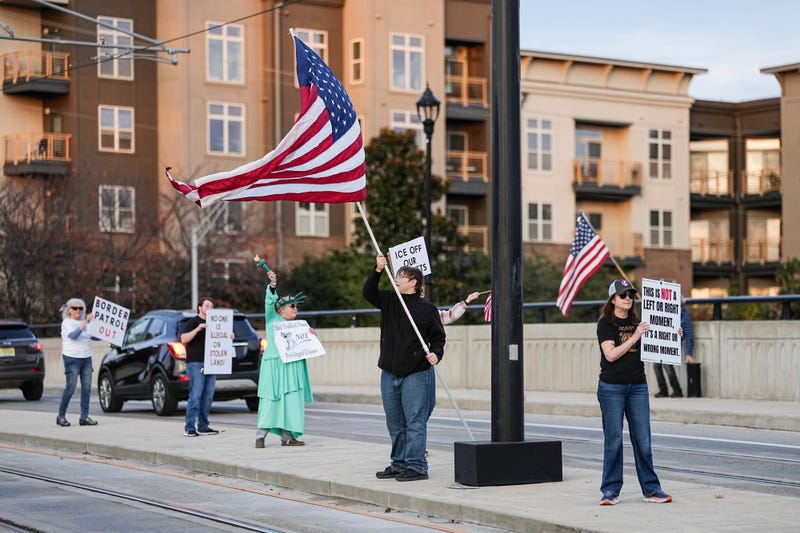
RALEIGH, N.C. (AP) — Federal agents expanded their North Carolinaimmigration crackdown to the area around the state capital of Raleigh on Tuesday, with fear spreading in at least one immigrant-heavy suburb where restaurants closed and many people stayed home.
The North Carolina operation began over the weekend in the state’s largest city, Charlotte, where officials said more than 130 people have been arrested.
Speaking at a Raleigh City Council meeting, Mayor Janet Cowell said there had been “confirmed sightings” of Border Patrol officers operating in Wake County, which includes Raleigh, and nearby Durham County, which includes the city of Durham. She said earlier that she did not know how large the operation would be or how long agents would be present.
She encouraged residents to call the police department if they felt unsafe and urged protesters to remain peaceful.
“And just be particularly kind to your neighbors today,” she added.
Federal officials have said the crackdowns will reduce crime, though leaders in both Charlotte and Raleigh said crime was down. The officials have also criticized so-called sanctuary policies that limit cooperation between local authorities and immigration agents in a handful of jurisdictions.
Anxiety spreads swiftly in Raleigh suburb
Federal officials have given no information about activity in the Raleigh area.
But in Cary, a sprawling Raleigh suburb where officials say almost 20% of the population was born outside the U.S. and the large Asian population tripled in the 1990s, fear spread quickly.
An area resident recorded as a large black SUV with darkly tinted windows and Texas license plates drove through Cary's downtown, eventually linking up with another SUV. The vehicles stopped at a construction site, where Pamela Hoile recorded Border Patrol agents detaining four workers. Speaking by phone after posting the video on Facebook, she described herself as a “very outraged, horrified and concerned citizen.”
The Chatham Square shopping center, which is usually bustling at midday with workers eating at mom-and-pop ethnic restaurants, was quiet. Most of the restaurants — Mexican, Indian and Chinese among them — were closed. Nearby, the often-full parking lot at an Indian grocery store was largely empty, and traffic inside was nonexistent.
Esmeralda Angel's family closed their restaurant, the Esmeralda Grill, to avoid any confrontations between customers and federal agents. At their separate grocery store, they were delivering items to customers who were avoiding going out in public.
The family businesses had scaled back to help their community, she said, but knew it would hurt financially.
“Taco Tuesday is the busy day for all of these restaurants,” Angel said of the weekly specials. “But I think everyone would rather close than operate.”
Congresswoman calls deployment ‘profound abuse of power’
U.S. Rep. Valerie Foushee, a Democrat who represents Durham, part of Raleigh and some suburbs, said Tuesday that the deployment of federal immigration agents in North Carolina “is a profound abuse of power, a violation of civil rights and a stain on our democracy.”
The region's South Asian community has grown dramatically in recent decades, including many people drawn to the Research Triangle region by high-tech jobs.
Satish Garimella is mayor pro tempore in Morrisville, about 15 miles (24 kilometers) west of downtown Raleigh. Close to half of the town’s 30,000 people are Asian.
Garimella, who grew up in India but is now a U.S. citizen, said the expected arrival of immigration agents is “creating a lot of panic,” and he recommended residents carry identity documents.
“You just don’t know when you will be questioned and what things are needed,” Garimella said.
The Trump administration turned to North Carolina after immigration crackdowns in Los Angeles and Chicago, both deep blue cities in deep blue states run by nationally prominent officials who are often loudly critical of President Donald Trump. They also increased operations in Portland, Oregon, where more than 560 immigration arrests were made in October, according to U.S. Border Patrol Chief Michael Banks.
North Carolina was a more surprising target.
The mayors of Charlotte and Raleigh are both Democrats, as is the governor, but none are known for wading into national political battles. In a state where divided government has become the norm, Gov. Josh Stein in particular has tried to get along with the GOP-controlled state legislature. The state’s two U.S. senators are both Republican, and Trump won the state in the last three presidential elections.
State was drawn into national debates
A handful of cities and counties in North Carolina have been drawn into America’s debates over crime and immigration, two of the most important issues to the White House.
The most prominent was the fatal stabbing this summer of Ukrainian refugee Iryna Zarutska on a Charlotte light-rail train, an attack captured on video. The suspect was from the U.S., but the Trump administration repeatedly highlighted that he had been arrested more than a dozen times.
While the Department of Homeland Security has said it is focusing on the state because of sanctuary policies, most North Carolina county jails have long honored “detainers,” or requests from federal officials to hold an arrested immigrant for a limited time so agents can take custody of them.
Some common noncooperation policies have existed in few places, including Raleigh and Charlotte, where the police do not help with immigration enforcement.
In Mecklenburg County, the jail did not honor detainer requests for several years, until after state law effectively made it mandatory starting last year. Wake County, where Raleigh is located, had a similar policy.
DHS said about 1,400 detainers across North Carolina had not been honored since October 2020, putting the public at risk.
Matt Mercer, a spokesperson for the North Carolina Republican Party, said in a text message that the arrival of immigration agents to Raleigh would show that failures by “radical Democrats will finally be taken seriously.”
___
Sullivan reported from Minneapolis. Associated Press Writer Travis Loller in Nashville, Tennessee, contributed to this report.